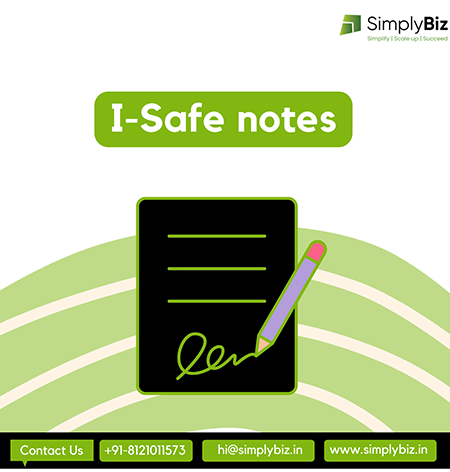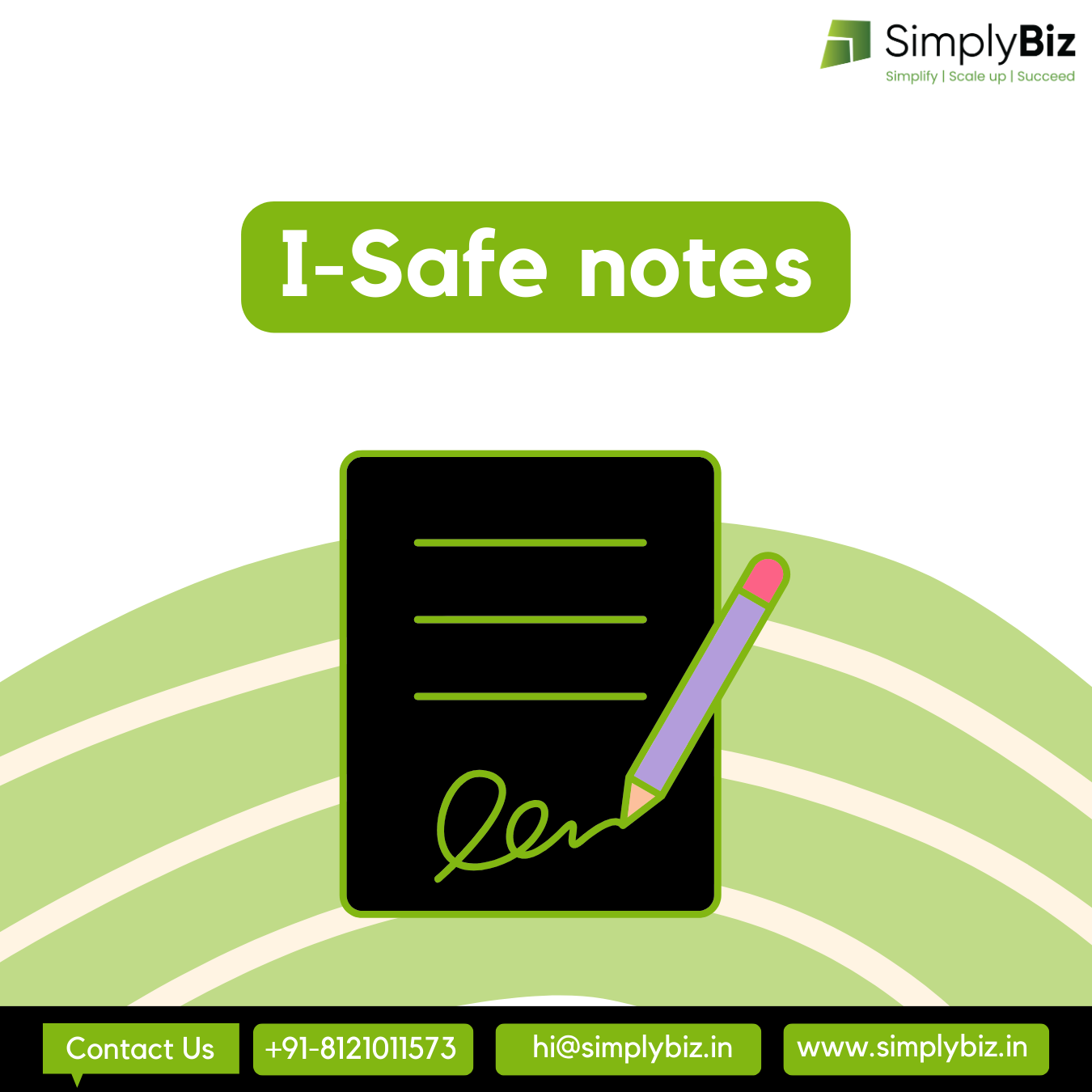I-Safe Notes
Email id: pooja@simplybiz.in
I-safe Note
India Simple Agreement for Future Equity (I-Safe) Notes comes out to be a new and attractive way and are mostly in demand by startups. I-Safe cannot be categorized as debt as they do not accrue interest or have a maturity date. In the same way, they cannot be referred to as equity because there are no dividends, voting and other shareholder rights. These are sort of Convertible Notes (CNs) only. But unlike convertible notes, they are not debt instruments. Being a Non-debt instrument, they don’t require to have any interest rate but keeping compliance perspective in mind it’s recommended to have a non-cumulative dividend at 0.0001%.
From the viewpoint of the legal structure, it has been given the status of Compulsory Convertible Preference Shares (CCPS) as specific I-Safe Notes are nowhere defined in the Companies Act 2013.
Who can issue I-Safe Notes
Only Companies (not necessarily startup companies only) can issue I-Safe Notes. An LLP or other form of organizations can’t issue I-Safe Notes.
To whom I-Safe can be issued
I-Safe Notes can only be issued to Indian investors.

Ways to issue I-Safe
- Fixed Conversion
In this category of I-Safe Notes, the company issue shares with fixed conversion date and price. - Discount
In this category of I-Safe Notes, there is no valuation CAP, and the conversion happens at discount. - Valuation CAP
In this category of I-Safe Notes, the investor negotiates for conversion on Valuation CAP fixed beforehand, and no discount on conversion is allowed. This benefits investors and against the interests of the inventor since investors can obtain a sizable share of equity with only a little initial investment. Due to this, it is less preferred by many startups. - Valuation CAP and Discount
In this category of I-Safe Notes, both a Valuation cap and discount exist. The conversion happens on, Valuation CAP or Discount on the valuation to the next price round, whichever is lower. - Most Favored Note
In this category of I-Safe Notes, there is a Most favored note clause in the I-Safe agreement, that allows the initial I-Safe investor to get the terms of the I-Safe note changed if there is a subsequent issue of I-Safe or CCPS and terms of the subsequent issue seem to be more favorable or profitable to the initial I-Safe investor. The issuer should disclose the most favored note clause in all subsequent issues so that it will have a binding effect.
Valuation Requirement
There is no requirement to get the valuation report at the time of issue of the I-Safe Notes. But the same needs to be done at the time of conversion.
Lock-In Period
A lock-in period of 1 year, or such other period as prescribed under SEBI (Alternative Investment Funds) Regulations, 2012.
Benefits
- To Startups
- There is no interest component as it’s not a debt.
- Less costly as no additional expenses to hire any experienced person to draft any documents like SHA.
- Simple document – No lengthy documentation
- Transaction can be concluded in a short time span of 2-3 days.
- To Investors
- I-Safe Investors get priority over other equity shareholders in case the business fails.
- Investors don’t have to wait long for the transaction to get close.
- No dilution of Cap-table until the next price round or conversion.
Difference between I-Safe and CCPS
There is no Valuation required in the case of I-Safe notes but CCPS does require the valuation. CCPPS holders may have a Board seat unlike in the case of I-Safe where no Board seat is offered. The main basis of any CCPS issue is Shareholder Agreement, which is a complex and lengthy part, whereas I-Safe Notes require a small and simple document which makes the process easier.
Taxation
Section 47 (xb) of the Income Tax Act of 1961 says that a company’s conversion of preference shares into equity shares is not considered a transfer. As a result, there is no capital gain tax due at the time of conversion. When the aforementioned shares are sold, capital gains are subject to tax. The capital gain will be the difference between the exercise price and the sale price. The duration of ownership of the shares will be used to calculate both the long-term and short-term capital gains, respectively. The tax on investments in eligible startups that are greater than their fair market value has been waived by the government. These kinds of investments can be made by local angel investors, members of a family, or funds that are not registered as venture capital funds.
Procedure for issue of I-Safe Notes
- The process begins with an increase in the authorized share capital of the Company. The company needs to conduct a Board Meeting, followed by an General Meeting to get approval for increasing the authorized capital from Board and members too. Subsequently, the following forms need to be filed with ROC:
- MGT-14, within 30 days of GM, for submitting the resolutions passed in GM with ROC.
- SH-7, for increase in the authorized capital of the Company and updating Companies Master data on MCA.
- Next comes the I-Safe Agreement. The company needs to enter an I-Safe agreement with I-Safe investors. In the agreement, the following terminology should be clearly stated: valuation cap, discount, investment amount, liquidation preference, etc.
- The next step is the issue of I-Safe Notes. The most preferable way to issue the same is the Right issue, as the same does not require any valuation. Company needs to Conduct a Board Meeting and pass a Board Resolution for approving issue of I-Safe Notes.
- Once the amount has been received from the investors, we can proceed with allotment of I-Safe Notes. Again, a Board Meeting needs to be convened to approve the allotment of I-Safe Notes. Subsequently, the following forms need to be filed with ROC:
- Form PAS-3, within 30 days of allotment of I-Safe Notes, for filing return of allotment with ROC.
Conclusion
In this article we discussed about I-Safe Notes Despite i-Safe Notes, its type, benefits, procedure to issue the same etc. I-Safe notes being relatively new in India, start-ups are increasingly utilizing them since it saves them time, efforts and costs.
Our product SimplyTransact is just meant for you. Please reach out to our Product Head– Ms. Shilpa Agarwal at the mail ID shilpa@simplybiz.in or SimplyTransact@simplyBiz.in to know more.


2 Replies to “I-Safe Notes”
What is the minimum invest amount under I-SAFE
There is no minimum amount of investment sir.
Let us know if you need any assistance in issuing I-Safe notes